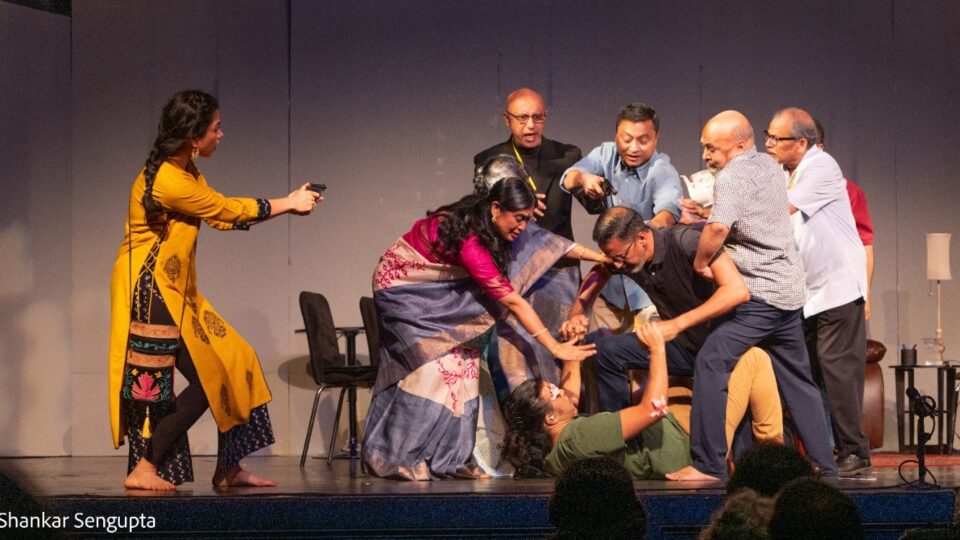BY JYOTHSNA HEGDE
Photos by Shankar Sengupta
Atlanta, GA, April 11, 2024: “You need three things in the theatre–the play, the actors, and the audience–and each must give something,” British actor Kenneth Haigh famously said. Each of the three gave more than something in Atlanta Theatre Workshop’s ANAMIKA, a play that featured at the Red Clay Music Foundry in Duluth on March 17, 2024.
“A full house, your spontaneous applause, your post-show words of appreciation, and continued support. You made the evening memorable for us. Thank you!” Playwright, Director, Original Background Scorer, Set, Lighting & Production Designer Dr. Raktim Sen expressed.
Atlanta art connoisseurs were treated to ANAMIKA, a full-length bilingual thriller that riveted the audience from the get-go all the way to its striking climax. The play, set in South Kolkata, traces the happenings over a weekend. ANAMIKA, an Indian American Engineer and an undercover intelligence officer, comes to Kolkata, India, to investigate the murder of her friend and colleague, April White. In Kolkata, her only contact is Ramen Chowdhury, her classmate’s father’s friend.
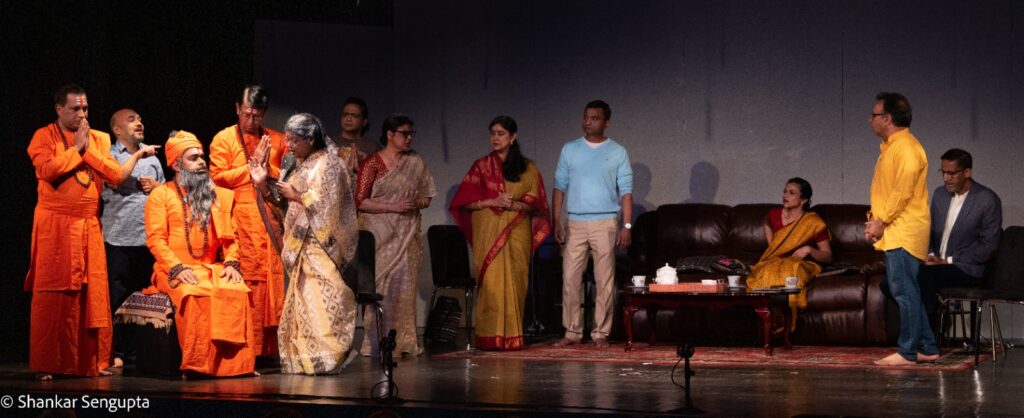
On day one, she runs into Soumen, a cab driver, while escaping from an unsuccessful attempt to get into April’s flat. That evening, when she visits Ramen Chowdhury, she discovers that Soumen is Ramen’s youngest brother and that Hemen, their eldest brother, is absconding and is a suspect in the murder of a Jadavpur University professor. At the Chowdhury’s that evening she also meets Shanku Acharya, who introduces himself as Hemen’s classmate. Anamika suspects Shanku to be the person who attacked her while she was trying to enter April’s flat. Another guest, Swami Barananda, gives her interesting clues about Shanku.
On day two, Anamika pleads with Hemlata to invite Shanku and keep him engaged until she can get in and out of April’s flat. She also convinces Soumen and Niloy, Ramen’s son, to follow Shanku. Niloy finds Shanku’s passport in his jacket and steals it. It comes in handy to bring him back to the Chowdhury residence. During that time Anamika is able to recover the evidence from April’s flat.
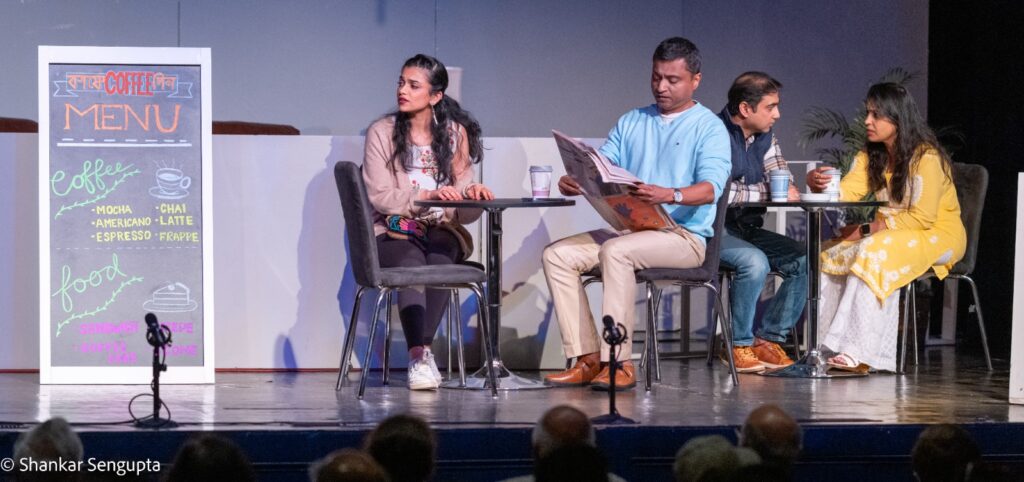
Who was the culprit? And who were the detectives? Dr. Sen’s ANAMIKA blends it all together beautifully to unravel the mystery in a dramatic climax, aptly tying the title ANAMIKA (which translates to the finger without a name) to the storyline.
The elaborate audio and visual props, complemented by a multi-faceted and organic performance by local artists, elevated the theatrical experience. Dr. Sen notes that this is a “conversational play”, in that the story is presented in the form of conversations people have in their daily lives. “I consider this form the most difficult to present,” he added.
Instead of the usual Scene 1, Scene 2, or Act 1/2, Dr. Sen chose to present each scene as an episode with a title, similar to a modern-day television series.
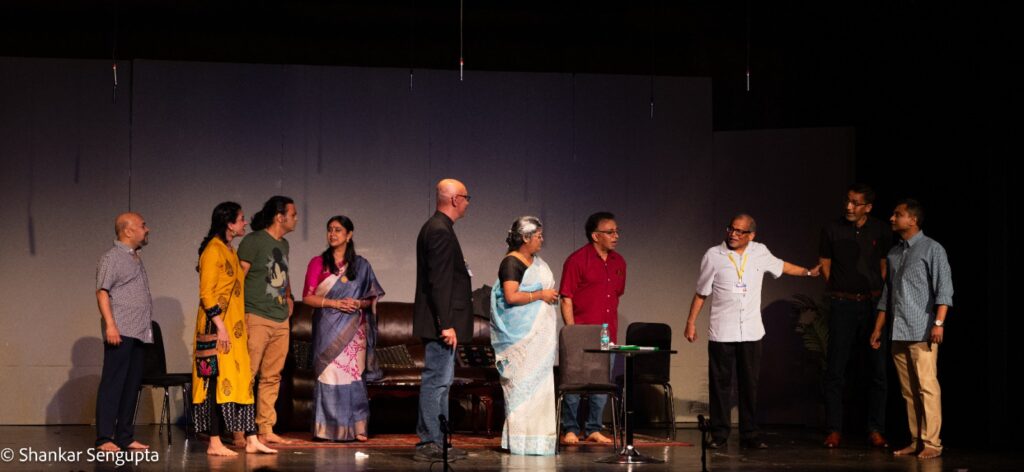
In a first of Atlanta Theatre Workshop production, one major character (the female lead, Anamika) always spoke in English and the rest of the characters in Bengali among themselves and sometimes in English. “The challenge was to intersperse English within Bengali dialogs and yet make the conversations sound as natural as possible,” Dr. Sen said.
The concept of a conversational play, skillfully executed by each actor portraying their characters, engaged the viewer as if they were watching the happenings unfold in real-time. The clever use of the episode format combined with the conversational style created a feel of the soaps on TV, garnering the attention of TV aficionados as well.
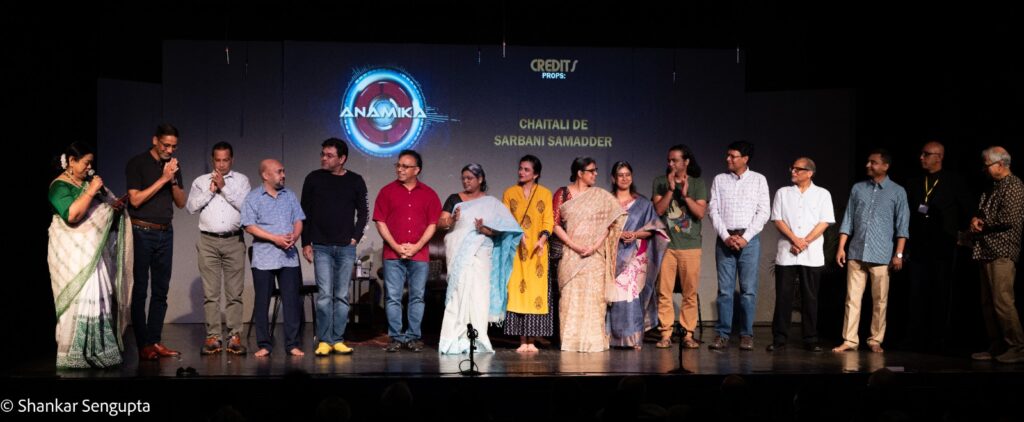
For the storyline, Dr. Sen drew inspiration from his past. “During my days in engineering college, West Bengal was going through political turmoil. One of the many victims during that era was a Jadavpur University professor who was murdered ruthlessly. This, along with my wanting to write a play that had a second-generation Indian American character, were the genesis. Of course, I postponed the time-period of the play by a couple of decades to keep the politics of the 1970s away,” he said. While he had sketched the draft in 2022, the story was written as a play in 2023, most of it during his long flights between India and Atlanta.
The most challenging part, Dr. Sen admits, was “to be able to keep the audience’s attention for two hours straight in a conversational play.” This aspect can never be underestimated, he noted. “We do plays for the audience. If I lose them midway, that’s a death knell! Additionally, when you are dealing with new technologies and visualization concepts, you always run the risk of failure.”
ANAMIKA is Dr. Sen’s 18th stage production. While some of it is scripted by him, he has also adopted a few. Along with scripting the play, he dons several hats at various stages of production. The entire process from finding (or writing) a script all the way to promoting the play until opening night can be a daunting experience. What motivates him to do it every year? “A theatrical play is a culmination of several branches of art and engineering. From writing an original play, scoring the background music (I am a composer- so it helps), designing the set and costumes, make-up, implementation, which needs a lot of engineering and sciences- a variety of expertise comes to play together with a common goal of keeping the play interesting at all times. There is no other field, except, cinema, that encompasses so many disciplines. As an artist, I can imagine the possibilities. Nothing can be more gratifying than seeing all of these come together. It’s a lot of hard work for me and the entire team,” Dr. Sen expressed.
“Since our first in 2011, we consistently tried to produce and present stage plays of the highest quality. We are thankful to our audience who come every year to our shows. That’s a blessing we don’t take lightly!” Dr. Sen expressed.
ANAMIKA is our 18th stage production. Since our first in 2011, we consistently tried to produce and present stage plays of the highest quality. We are thankful to our audience who come every year to our shows. That’s a blessing we don’t take lightly!
His next production is Nobel Laureate Rabindranath Tagore’s iconic play RaktaKarabi (Red Oleanders). The year 2024 happens to be the centennial year of its publication and this, Dr. Sen notes, is a “great way to celebrate Tagore and his creativity.”
“The stage is not merely the meeting place of all the arts but is also the return of art to life,” Oscar Wilde famously said. Bringing art to life for Atlanta for over a decade, it is heartwarming to watch folks such as Dr. Sen strive to keep the art form alive and thriving despite the digital era of OTT available at your fingertips on your couch. Here’s to the art, the artists, and the art connoisseurs of our times. May you always flourish!
The cast included Amartya Samadder, Anindya De, Anindya Mukherjee, Arunava Saha, Chaitali De, Debatirtha Basu, Kaushik Basu, Kaushik Datta, Niloy Bhattacharya, Rimi Bhattacharya, Sangita Nandi, Sanjib Datta, Sarbani Samadder, Subhro Maitra, Swarup Nandi, and Urvashi Betarbet.
The Crew: Compère: Richa Sarkar, Costumes: Munmun Sen & Sarbani Samadder, Props: Chaitali De & Sarbani Samadder, Play Video: Raktim Sen, Prod. Asst.: Debatirtha Basu, Stage. Mgr.: Kallol Nandi, Make-up: Rina Datta Chakravorty, Art: Urvashi Betarbet & Raktim Sen, Audio Tech: Shalom Aberle, Lighting Tech: Corey Giessen, A/V Asst: Niloy Bhattacharya, Photography: Shankar Sengupta, Videography: Saikat Das, Box Office: Munmun Sen, Volunteer Ushers: Amshasree Shastrula, Poorvi Mathur & Trisha Maheshwara





